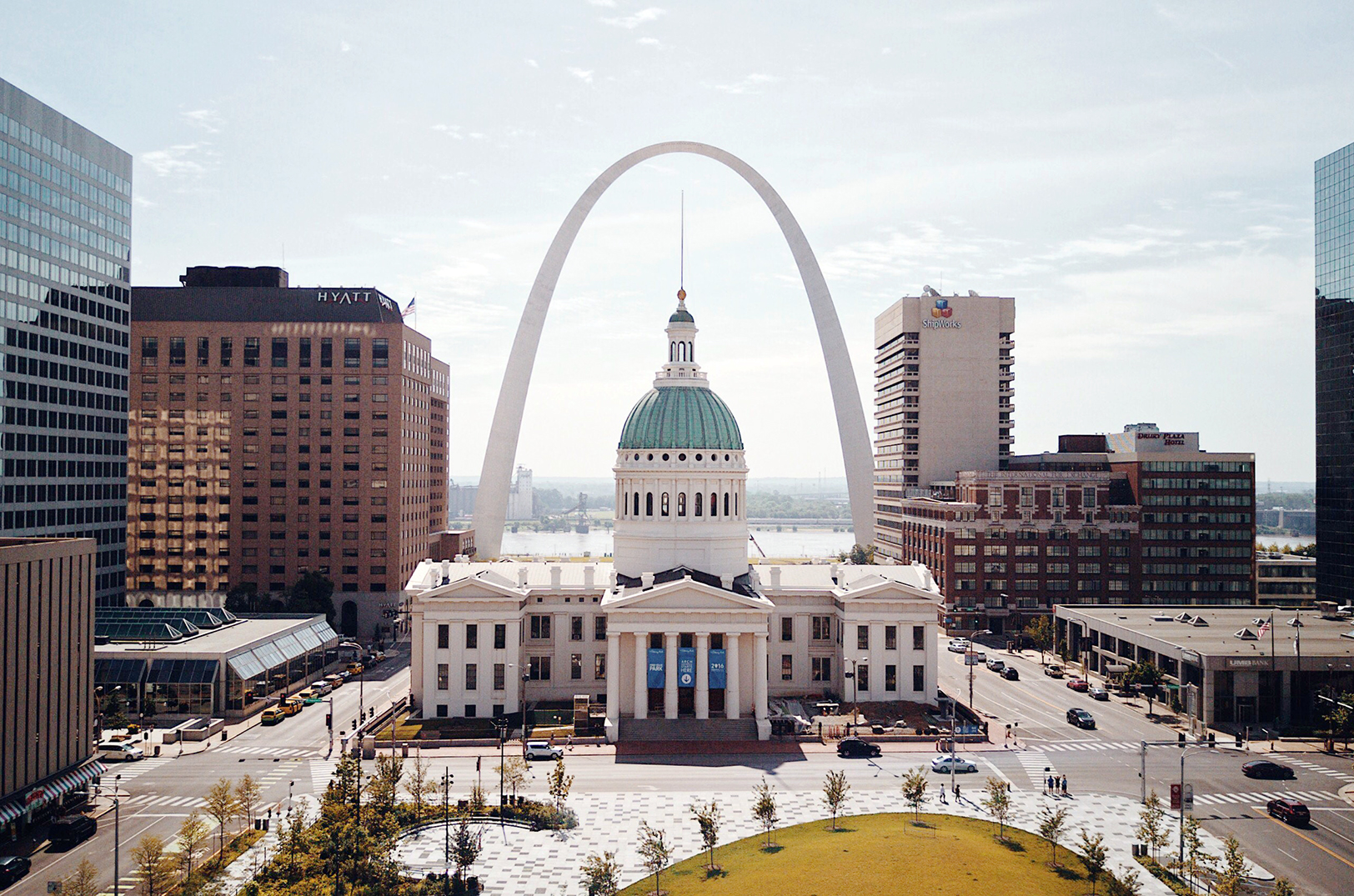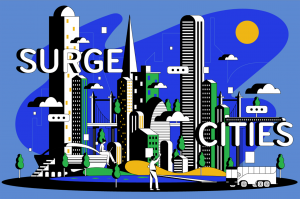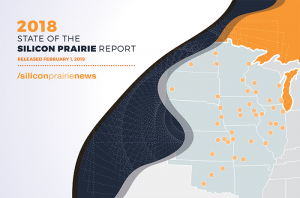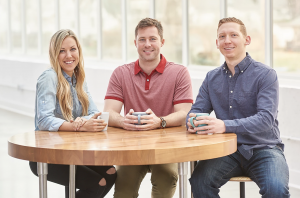Founders hoping to launch a new startup or move into a fresh market might have better success in St. Louis, rather than Kansas City, according to Inc. magazine’s Surge Cities Index.
Inc. placed St. Louis at No. 33 on its 50 Best Places in America for Starting a Business list. Kansas City was positioned at No. 40.
“The home of the Gateway Arch might be better known as the Turnaround City,” writes Inc., noting the eastern Missouri metro has become a hub of agtech activity. “After experiencing a decline for 15 years, St. Louis has increased its rate of business creation every year since 2009. It now has 200 to 350 active tech startups and more than 50 support organizations centered on three hubs: downtown accelerator T-Rex, the 200-acre Cortex Innovation Community, and the 39 North district near the Yield Lab North America agtech accelerator.”
While the magazine characterized Kansas City’s startup scene “as creative as it is generous,” it emphasized previous years’ community wins.
“The city got a boost when, in 2011, Google announced it would test Google Fiber there,” Inc. writes in the report. “Investments in startups followed, reaching $540 million in 2017, as did a 290 percent increase in access to capital from 2013 to 2016.”
Inc. credited Sprint, Dairy Farmers of America and Hallmark with supporting startups in Kansas City, but noted the business environment continues to be dominated by the health care industry.
Click here to read the full Surge Cities: 50 Best Places in America for Starting a Business list.
Outmatched on the Silicon Prairie?
The Surge Cities index echoes shades of the 2018 State of the Silicon Prairie report, which suggested Kansas City was falling behind its peer cities in the Midwest, notably St. Louis.
While St. Louis won big in 2018 with $545 million in venture capital deployed — an overperformance of nearly $300 million — according to Chapman and Company (authors of the Silicon Prairie report), Kansas City only produced $96 million in venture capital in 2018 — an underperformance of nearly $100 million.
“The [Kansas City] community boasts the fastest broadband speed and is competitive in most of the other categories. However, this city appears to struggle with respect to producing large, high growth companies,” reads the 2018 State of the Silicon Prairie Report, published in February by the Silicon Prairie News.
Click here to read more about the State of the Silicon Prairie report.
It’s a signal Kansas City “needs to grow outside of its borders and serve broader customer groups,” the report said.
Optimism, energy and Inc.’s KPI metrics
Leading a startup transplanted from St. Louis to Kansas City, Greg Blome said the company he co-founded has found tremendous success and support in the City of Fountains.
“I didn’t consider moving anywhere other than Kansas City, and I still have great things to say about St. Louis,” said Blome, CEO of Omega Power Creamer. “From my perspective, KC is definitely moving in the right direction in the startup space among Midwest cities. There is a lot of optimism and energy among those I have connected with.”
Click here to read more about Omega Power Creamer’s journey across the Show Me State.
In determining its Surge Cities ranking, Inc. compared St. Louis, Kansas City and the 48 other largest metropolitan statistical areas on seven key performance indicators:
- JOB CREATION — Over-the-year percent change in the number of jobs from Q1 2017 to Q1 2018.
- POPULATION GROWTH — Percentage growth from July 2016 to July 2017.
- NET BUSINESS CREATION — Over-the-year percent change in the number of business establishments from Q1 2017 to Q1 2018.
- RATE OF ENTREPRENEURSHIP — Percentage of adults who are entrepreneurs, including solo-preneurs, regardless of industry or employment status in the 2017 to 2018 period.
- WAGE GROWTH Over-the-year percent change in average weekly earnings from Q1 2017 to Q1 2018.
- HIGH-GROWTH-COMPANY DENSITY — Number of high-growth companies for every 100,000 adults, including only Inc. 5000 firms with $2 million in annual revenue and 20% year-over-year growth for three years in 2017 and 2018.
- EARLY-STAGE FUNDRAISING DEALS — Number of early-stage funding deals for every 100,000 adults from October 2017 to October 2018.
“Inc. has long believed there’s an alchemy that happens when fast-growing companies, innovative activity, and an entrepreneurial environment coalesce in a particular geographic space,” the magazine said, explaining its metrics.
A peer at No. 1
Of the top five cities on the Inc. Surge Cities ranking, three are considered peer metros by KC Rising — which promotes economic growth in the Kansas City region — including Austin, Texas, at No. 1.
TOP 5 SURGE CITIES
No. 1 – Austin*
No. 2 – Salt Lake City
No. 3 – Raleigh*
No. 4 – Nashville*
No. 5 – San Francisco
* KC Rising peer metros
“We are progressing — and we’ve seen growth in every measure we track — but we’re simply not moving fast enough relative to our peers and our own horizon for KC,” said Bill Gautreaux, KC Rising co-chair, at a Feb. 26 update to KC Rising stakeholders and members of the public.
Click here to read more about the KC Rising report on the metro’s “good, but not good enough” progress.
In contrast, Austin is now growing four times faster than most of Silicon Valley — drawing talent and startups from all over the country, Inc. notes.
The allure is obvious, Donald Hawkins, co-founder of KC Collective, suggested at a March 2 KCMO budget hearing, describing why his early-stage startup, CitySmart, turned to Austin for funding and resources.
“We needed money! We needed money to be able to grow and I was not able to find money here [in Kansas City],” Hawkins said.
Click here to learn about how KC Collective is banding together early-stage founders.
Community collaboration will be needed to pull Kansas City higher in the metrics judged by organizations like KC Rising, said Neal Sharma, co-chair of KC Rising and CEO and co-founder of DEG.
“There is much work left do for our city, and it will take all of us together to get it done,” Sharma told a crowd at the Feb. 26 KC Rising event. “I’ve been a Kansas City resident for most of my life. I built my business here. I’m raising my family here. And there have been times in our past, in my lifetime, where we didn’t lack the skills or the talent or the work ethic required to build a brighter future — we had that in spades. What it felt like we lacked was the confidence — even though we knew in our hearts we had what it takes.”









































